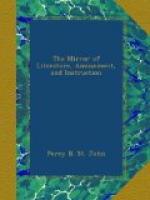The reason why they are neglected so;
And ask if yonder village holds its feast
And thou awhile art there detained a guest,
While all the flowery tribes make sad complaint.
For want of water they are grown quite faint.
Tipton. T.S.A.
[4] Anteuil, near Paris.
[5] Horace speaks thus to
his steward in the country. Epistle
xiv. book 1.
[6] Lewis XIV.
[7] See Ode sur la prise de Namur.
[8] This metaphor has been considered too bold, and perhaps justly, but Despreaux did not think it so. He observed to M. Dagnesseau that if this line were not good, he might burn the whole production.
* * * * *
THE SELECTOR, AND LITERARY NOTICES OF NEW WORKS.
* * * * *
LIVES OF BRITISH PAINTERS, SCULPTORS, AND ARCHITECTS.
By Allan Cunningham.
This volume is the first of a series of Lives of Artists, and the fourth number of Murray’s Family Library. The author is a first-rate poet, but it appears that he undertook this task with some diffidence. We have, however, few artists of literary attainments, and they are more profitably employed than in authorship. Little apology was necessary, for of all literary men, poets are best calculated to write on the Fine Arts: and the genius of Poetry, Painting, Sculpture, and Music, is often associated in one mind, in love of the subjects at least, if not in practice.
Prefixed to the “Lives,” is a delightful chapter on British Art before the birth of Hogarth, from which we quote the following:—
“Poetry, Painting, Sculpture, and Music, are the natural offspring of the heart of man. They are found among the most barbarous nations; they flourish among the most civilized; and springing from nature, and not from necessity or accident, they can never be wholly lost in the most disastrous changes. In this they differ from mere inventions; and, compared with mechanical discoveries, are what a living tree is to a log of wood. It may indeed be said that the tongue of poetry is occasionally silent, and the hand of painting sometimes stayed; but this seems not to affect the ever-living principle which I claim as their characteristic. They are heard and seen again in their season, as the birds and flowers are at the coming of spring; and assert their title to such immortality as the things of earth may claim. It is true that the poetry of barbarous nations is rude, and their attempts at painting uncouth; yet even in these we may recognise the foreshadowings of future excellence, and something of the peculiar character which, in happier days, the genius of the same tribe is to stamp upon worthier productions. The future Scott, or Lawrence, or Chantrey, may be indicated afar-off in the barbarous ballads, drawings, or carvings, of an early nation. Coarse nature and crude simplicity are the commencement, as elevated nature and elegant simplicity are the consummation of art.




